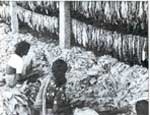Sap zap
 WANT to get vaccinated against malaria? Just chew a few tobacco leaves instead. Researcher Thomas H Turpen of the California-based Biosource Technologies Inc and his colleagues at the Naval Medical Research Institute in Bethesda, the US, have worked out a way to produce an experimental vaccine against malaria by genetically engineering a virus that attacks tobacco, and then using it to infect the plant (Biotechnology, Vol 13, No 1).
WANT to get vaccinated against malaria? Just chew a few tobacco leaves instead. Researcher Thomas H Turpen of the California-based Biosource Technologies Inc and his colleagues at the Naval Medical Research Institute in Bethesda, the US, have worked out a way to produce an experimental vaccine against malaria by genetically engineering a virus that attacks tobacco, and then using it to infect the plant (Biotechnology, Vol 13, No 1).
The researchers are hopeful that the vaccine will be effective against malaria, but they are primarily interested in showing that plants can be used -- literally -- to grow vaccines. This, they contend, would be a cheaper way to produce vaccines. Moreover, these vaccines would also be easier to produce than those made conventionally from broths of microorganisms in fermenters.
The virus infects the plant and multiplies in it, and Turpen and his colleagues reckon that as much as a milligram of the vaccine is produced per gram of plant tissue. They estimate that a ha of tobacco plants could produce as much as 250 kg of vaccine a month.
The Bethesda team lead by Stephen L Hoffman identified proteins on the surface of the malaria parasite which trigger a strong immune response in humans. They identified the genes that produce these proteins, and the California group incorporated a synthetic version of these genes into the DNA of the tobacco mosaic virus. This altered virus was then used to infect tobacco plants.
The infected plants produced large quantities of the malaria parasite protein in the tobacco leaves. This protein was extracted by grinding the leaves and processing the material. The researchers say that the protein, when extracted, can be used as a vaccine; in fact, the entire tobacco mosaic virus can be used, especially since it is harmless to human beings. The protein will soon be tested on mice by Hoffman's team.
Meanwhile, the researchers are excited about the prospects this research opens up. Other researchers are also trying to produce vaccine in plants, including Charles Arntzen and Hugh Mason at the Texas A&M University, who have grown plants to produce vaccines against hepatitis B.
Related Content
- First food: business of taste
- State of the Climate in Asia 2024
- Order of the National Green Tribunal regarding the deplorable condition of a water tank, Golconda Fort, Hyderabad, Telangana, 05/06/2025
- Order of the National Green Tribunal in the matter of Futala lake pollution, Nagpur, Maharashtra, 05/06/2025
- Order of the National Green Tribunal regarding large scale felling of toddy yielding palm trees in Bihar, 05/06/2025
- Order of the National Green Tribunal regarding deterioration of Nayar river, Uttarakhand, 05/06/2025
